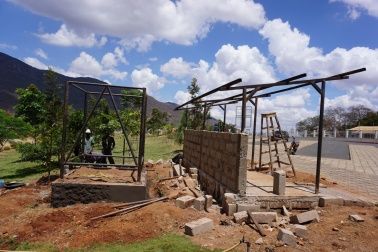The East African Community (EAC) Secretariat is making progress in a project aimed at strengthening the capacity of EAC Partner States to prevent and control the spread of infectious diseases using hygiene measures, risk communication and community sensitization. The project targets “hotspots” in the region that have a high risk for infection transmission due to crowded living conditions and a lack of clean water as causes of poor hygiene. The Secretariat is collaborating with the International Organization for Migration (IOM) in the implementation of the water, sanitation and hygiene (WASH) project.
Deputy Secretary General of Productive and Social Sectors, Hon. Christophe Bazivamo, recognised the progress made in establishing the handwashing facilities which cater also for children and people with disabilities: “Some of the handwashing facilities have already been completed awaiting handover to authorities and others are at various stages of construction. In addition, more than 1 million people will be reached with health and hygiene promotion initiatives, thanks to a financial support of 1.5 Million EUR from the German government.
Water harvesting facilities have been established at Musanze, Nyagatare, Rubavu and Kihere districts in Rwanda, and handwashing facilities have been finalized at Mutukula and Namanga Points of Entry in Tanzania. “Work is in various stages at other sites in the EAC Partner States of Burundi, Kenya, South Sudan, Tanzania and Uganda”, says Dr Aymen Jarboui, IOM Regional Health Program Officer (COVID-19), adding: “We have also started with risk communication and sensitization on the crucial role of hygiene in infection prevention control.”
Extensive land borders and high human mobility in the region, make the communities at the borders and along the transport corridors but also in densely populated areas with limited access to water vulnerable to communicable diseases. Over the past five years alone, the EAC region has experienced communicable, and water borne diseases outbreaks including COVID-19, Cholera, Measles, Rift Valley Fever, Yellow Fever, Crimean-Congo Hemorrhagic Fever and E. Coli infections.
Targeted by the project are cross border communities, areas along transport and water ways, fragile urban communities, along with truck drivers, boda-boda riders, taxi drivers and migrants. Risk communication and hygiene sensitization measures also cover community leaders and local authorities such as border officials dealing with customs, immigration and port health.
Preparations for the project started in June 2021 through close coordination between the EAC Secretariat, IOM and Partner States’ Ministries of Health. In July the project team started collecting baseline data from households, points of entry and health facilities along selected borders and communities to guide field operations.
The health intervention is facilitated through the ‘Support to Pandemic Preparedness (PanPrep)’ project which is implemented through the Deutsche Gesellschaft für Internationale Zusammenarbeit (GIZ) GmbH.
